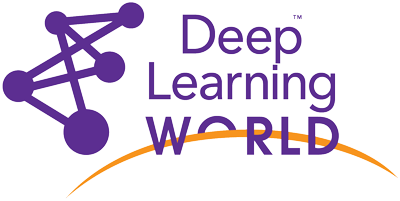Agenda
Deep Learning World 2023
June 18-22, 2023 – Red Rock Casino Resort & Spa, Las Vegas
To view the full 7-track agenda for the five co-located conferences at Machine Learning Week click here or for the individual conference agendas here: PAW Business, PAW Financial, PAW Healthcare, PAW Industry 4.0 or Deep Learning World.
Sessions pertaining to GENERATIVE AI have been labelled as such.
Workshops - Sunday, June 18th, 2023
Full-day: 8:30am – 4:30pm PDT
Gain experience driving R for predictive modeling across real examples and data sets. Survey the pertinent modeling packages.
Workshops - Monday, June 19th, 2023
Full-day: 8:30am – 4:30pm PDT
This one-day introductory workshop dives deep. You will explore deep neural classification, LSTM time series analysis, convolutional image classification, advanced data clustering, bandit algorithms, and reinforcement learning.
Full-day: 8:30am – 4:30pm PDT
This one-day session surveys standard and advanced methods for predictive modeling (aka machine learning).
Full-day: 8:30am – 4:30pm PDT
Machine learning improves operations only when its predictive models are deployed, integrated and acted upon – that is, only when you operationalize it.
Deep Learning World - Las Vegas - Day 1 - Tuesday, June 20th, 2023
Machine Learning Week Founder Eric Siegel will welcome you to the event and kick things off.
Join Kian Katanforoosh, CEO and Founder of Workera, as he explores the profound impact of generative AI on the workforce and the evolution of personalized learning. With his rich experience in AI education and having taught AI to over 4 million people with Prof. Andrew Ng as founding member of DeepLearning.AI, Kian's insights are uniquely informed and forward-thinking.
In this keynote, Kian will unravel how generative AI is reshaping learning, emphasizing the pivotal role of skills data in actualizing personalized learning. He will discuss the harnessing of this data to tailor learning experiences to individual needs, track progress, identify improvement areas, and improve workforce management.
Drawing from his experiences as a founding member of DeepLearning.AI and the co-creator of the popular Stanford Deep Learning Class, Kian will share his vision for a future where learning is as unique as we are. Attend this session for a deep dive into the convergence of AI, personalized learning, and workforce transformation.
Google continues to take a bold and responsible approach to developing and deploying AI through the company’s infrastructure, tools, products, and services. Google brought further AI breakthroughs into the real world through Google Cloud’s launch of the next wave of generative AI across core areas of their business, and new partnerships and programs grounded in Google’s commitment to an open AI ecosystem. At the same time, AI, as a still-emerging technology, poses complexities and risks; and the development and use of AI must address these risks in a structured, transparent, and accountable way. A robust governance structure – and rigorous testing and ethics reviews — is necessary to put responsible AI principles into practice. And with AI regulation coming soon, Jen will share learnings, challenges, and practical tips on how Google is maturing its responsible AI practices, processes, and tools in advance of greater regulatory, global standards, and consumer expectations.
In this session, Juan Acevedo, a machine learning architect at Google, will discuss how organizations can leverage Google Cloud's generative AI products to bring value to their businesses in a secure environment and responsibly.
Juan will cover the following topics:
What can you do right now with Google Cloud technology
Responsible generative AI
This session is for those who are interested in learning more about generative AI and how it can be used to improve their businesses.
At Paychex, we used large language models like SBERT to match client inputted job titles to a taxonomy of 800+ job categories provided by the US Bureau of Labor Statistics. Our multi-level architecture combines SBERT with neural network classifiers to achieve high matching accuracy. The SBERT model was fine-tuned in a Siamese network approach to improve its performance. The product will be available to our clients to recommend the best matching BLS codes for their inputted job titles. Normalizing job titles will provide Paychex clients with advanced wage or retention analytics.
Given ML is here to stay, and growing in complexity by the day, it has become now critical that we think deeply about how to properly align our models with human interests. Doing this correctly requires a cultural shift in the way most organizations approach the model development process. Traditional metrics like F1, accuracy, or ROC on held-out test sets are woefully inadequate indicators of alignment when considered on their own. However, with the right tooling and a clear alignment framework, if we apply the principles of TDD (test-driven development) in a collaborative and transparent manner to ML development, we can not only build more performant models with greater velocity, but also instill far greater confidence in the models we are integrating into human lives.
The use cases for deep learning seem endless — how do we decide which use cases to invest in? In this talk, I’ll be sharing what I’ve seen in how companies evolve their ML use cases and infrastructure over time. We’ll also go through a small exercise: given a business problem, how to analyze data and evaluate solutions to meet the business requirements and navigate tradeoffs.
While there is a lot of talk about the need to train AI models that are safe, robust, unbiased, and equitable - few tools have been available to data scientists to meet these goals. This session describes new open-source libraries & tools that address three aspects of Responsible AI. The first is automatically measuring a model's bias towards a specific gender, age group, or ethnicity. The second is measuring for labeling errors - i.e. mistakes, noise, or intentional errors in training data. The third is measuring how fragile a model is to minor changes in the data or questions fed to it. Best practices and tools for automatically correcting some of these issues will be presented as well, along with real-world examples of projects that have put these tools for use, focused on the medical domain where the human cost of unsafe models can be unacceptably high.
Product recommendation is at the heart of Personalization group’s efforts to help Albertsons customers. Deep Learning has become the go-to approach for recommendation. Therefore, the group has begun to put efforts into applying Deep Learning to enhance new product recommendations. First, leveraging transaction data and product catalog, we built Customer DNA and Product DNA models. Customer DNA model captures customer characteristics such as purchase behavioral pattern, dietary preference, e-com affinity, customer location, etc. and embeds into a list (vector) of numbers. Similarly, Product DNA model captures product characteristics (e.g., is product organic and/or sugar-free?) and product-product associations—e.g., bread and peanut butter are usually purchased together. Second, we leverage these models to build a next generation recommendation system—inspired by the Wide and Deep recommendation model architecture. Our experiments building the framework have generated favorable results and we will share our journey from model conception to putting it in in production to better serve our customers.
Document AI is one of the Machine Learning fields that study about understanding and analyzing documents like PDFs, DOCXs, etc. But with the growth of complex documents and limited data due to data privacy and security, industry ML practitioners are looking for a method that could augment data effectively. At Otrafy, we developed an augmented method that is a combination of CV and NLP where we augmented data based on both text and layout of the document. The study show that our works improve the performance of LayoutLM in both accuracy and runtime.
At Northwestern we have developed a system that is built to consume and capitalize on IoT infrastructure by ingesting device data and employing modern machine learning approaches to infer the status of various components of the IoT system. It is built on several open source components with state-of-the-art artificial intelligence. We will discuss its distinguishing features of being Kubernetes native and by employing our work that enables features to be specified through a flexible logic which is propagated throughout the architectural components. We will discuss select use cases implemented in the platform and the underlying benefits. The audience will learn how to build or use a streaming solution based on Kubernetes and open source components.
Deep Learning World - Las Vegas - Day 2 - Wednesday, June 21st, 2023
The conference chair will provide remarks and kick off Day 2 of the main program.
Most actionable data in enterprises are often relational data stored in tables connected by primary and foreign keys. Such data usually resides in transactional databases that run the production applications of the enterprise as well as in data lakes and data warehouses for analytics queries. Learning from such data is difficult due to the impedance mismatch between the relational schema and the training set, which is a single table with features, weights, and labels. The usual approach requires joining the normalized data and producing features for training and inference to produce the latter from the former. This is where most of the data science efforts for AI/ML efforts go today.
In this talk, I will present a representation learning approach for relational data that uses graph neural networks to learn directly from the raw relational data. Relational data comprises a graph based on the primary-foreign key relationships; thus, a graph view is more natural and simplifies the learning and the required infrastructure. I will present the benefits of this approach as implemented by kumo.ai to be enterprise-ready with reliability, scalability, and model performance.
At the RealReal we take in over 10k items daily. For each item 3-6 images are captured. Historically those images would be "retouched" by hand which include tasks such as aligning the mannequin, cropping at one of three fixed distances based on the length of the item, digitally removing the base of the mannequin and its shoulder seams all while providing a "luxury" feel. We've learned lots along the way to automating 87% of our supply saving millions each year.
In this talk, we will talk through the journey of building an end-to-end forecasting platform with a focus on feature engineering, consolidation of features in a single place (feature store), and leveraging DNN techniques to solve different forecasting problems like Demand forecasting, Replenishment, Inventory optimization, etc. powered through the same platform
As part of the session, we will review the journey with the following stages :
- Feature Engineering: Experimentation to add critical features like Product Hierarchies, Price Rank Ratios, historical aggregated features, etc. along with their impact on the model accuracy
- MLOps : Use open-source Kubeflow to orchestrate and automate the data load, feature engineering, and Model training along with Model Deployment
- Decomposition of Forecast: Decompose forecast into Base & Promo forecast for What-if Simulation to identify the impact of Promos on Forecasts. Also, expanding the approach to inventory optimization.
Language models have revolutionized the field of Natural Language Processing (NLP), and large language models in particular have opened up new avenues for research and applications. In this session, we will explore the key features and underlying mechanisms of large language models, and discuss their implications for NLP research, industry, and society.We will begin by introducing the basic building blocks of large language models and discuss the challenges of training and evaluating large language models, as well as their limitations and potential biases. We will then explore some of the key applications of large language models and the impact of large language models on industries such as healthcare, finance, and entertainment, as well as their potential for use in improving accessibility to information and services for marginalized communities.By the end of this session, participants will have a deeper understanding of the opportunities and challenges of large language models, and a broader awareness of their impact on NLP research, industry, and society.
Sami Ghoche, CTO & co-founder of Forethought will talk about advancements in LLMs such as ChatGPT and GPT4 in the context of deploying them for customer service applications including automation, agent augmentation, and insights & analytics. This talk includes an overview of Forethought's suite of products for customer service, powered by their AI engine called SupportGPT™
The surging demand for Natural Language Processing (NLP) and Large Language Models (LLM) has broken glass ceilings across industries in recent years. In fact, as per Fortune Business Insights, the global NLP market is projected to reach $161.81 billion by 2029, suggesting its importance to businesses and the broader economy as the volume of unstructured data increases.
As we become more reliant on NLP in our daily lives, it's crucial to be aware of the potential risks that come with it. In the absence of monitoring, these models are prone to causing unintended consequences and posing significant risks to businesses, from reputational damage to regulatory non-compliance.
Even the best human minds need sharpening, and the same goes for complex NLP models. Implementing embedding monitoring practices can help detect and reduce drift and bias, understand black-box model decisions, improve model performance, and minimize technical debt.
In this session, Devanshi Vyas, Co-founder at Censius will deep dive into the implications of unmonitored NLP and LLM in today’s world. Explore the key components of AI Observability, including Monitoring and Explainability, and how they can be applied to drive positive business outcomes.
Key takeaways:
- Explore the current state of unstructured data models possessing massive complexities
- The need for Observability in NLP to improve visibility and curb AI risks
- Strategies to leverage AI Observability with embedding monitoring to proactively troubleshoot models for optimal performance
Workshops - Thursday, June 22nd, 2023
Full-day: 8:30am – 4:30pm PDT
Python leads as a top machine learning solution – thanks largely to its extensive battery of powerful open source machine learning libraries. It’s also one of the most important, powerful programming languages in general.
Full-day: 8:30am – 4:30pm PDT
This one-day session reveals the subtle mistakes analytics practitioners often make when facing a new challenge (the “deadly dozen”), and clearly explains the advanced methods seasoned experts use to avoid those pitfalls and build accurate and reliable models.
Full-day: 8:30am – 4:30pm PDT
Generative AI has taken the world by storm, scaling machine learning to viably generate the written word, images, music, speech, video, and more. To the public, it is by far the most visible deployment of machine learning. To futurists, it is the most human-like. And to industry leaders, it has the widest, most untapped range of potential use cases.
In this workshop, participants will get an introduction to generative AI and its concepts and techniques. The workshop will cover different techniques for image, text, and 3D object generation, and so forth. Participants will also learn how prompts can be used to guide and generate output from generative AI models. Real-world applications of generative AI will be discussed, including image and video synthesis, text generation, and data augmentation. Ethical considerations when working with generative AI, including data privacy, bias, and fairness, will also be covered. Hands-on exercises will provide participants with practical experience using generative AI tools and techniques. By the end of the workshop, participants will have a solid understanding of generative AI and how it can be applied in various domains.



























